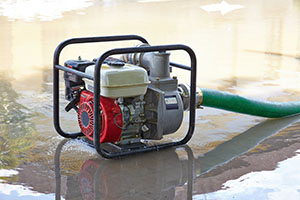Spring is just around the corner in North Carolina. With it will come melting ice and snow, rising waters, and an increased potential for serious water damage due to flooding. Most standard insurance policies do not cover flooding, and that includes business and commercial policies. So should you spend extra to protect your business from flooding? Here are some things you should consider.
What does flood insurance cover?
 First, it's important to know what flood insurance does and does not cover. Flood insurance will generally cover damage to buildings, air conditioning or heating systems, electrical, plumbing, carpeting and major appliances like stoves and refrigerators. Most personal property and valuables up to a certain amount would also be covered in the event of a flood. What's not covered? Landscaping or property outside of the insured property, vehicles, business interruption costs, and any damage that could reasonably have been prevented by the owner. You may be able to find coverage for these items through other policies.
First, it's important to know what flood insurance does and does not cover. Flood insurance will generally cover damage to buildings, air conditioning or heating systems, electrical, plumbing, carpeting and major appliances like stoves and refrigerators. Most personal property and valuables up to a certain amount would also be covered in the event of a flood. What's not covered? Landscaping or property outside of the insured property, vehicles, business interruption costs, and any damage that could reasonably have been prevented by the owner. You may be able to find coverage for these items through other policies.
Do I live in a high-risk area?
Although living in a low risk area does not guarantee you won't be affected by a flood, assessing your risk based on location is an important step in deciding whether or not to purchase flood insurance. In addition, if your building is located in a high risk area and your mortgage is federally regulated or insured, you may be required to purchase flood insurance. Talk to your insurance agent to find out if your business is in a high, moderate, or low-risk area. View a flood risk map for your location.
What can I afford to lose?
The type of business you own may influence your decision to purchase flood insurance in addition to a business or commercial policy. If you maintain expensive equipment or inventory, or if the building you are in is necessary to business operations, it might be in your best interest to purchase flood coverage.
Get the most out of your flood insurance policy
If your business is affected by a disaster, getting the most out of your policy will depend on how well you prepared before the flood occurred. Always keep an updated inventory of your property and its contents, and make sure to backup all important documents and information in a separate location. This information will be invaluable if you have to file a claim.
Following a major disaster, many businesses never reopen; and those that do often fail. Be sure this doesn't happen to you by assessing your company's unique risks and working with a trusted insurance agent to make sure you're covered.
For any flood insurance questions, call or contact Litaker Insurance today.
